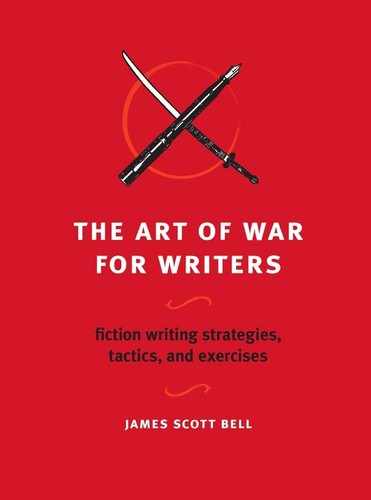
192
58
A goal is just a dream
unless it has legs.
There is a well-defi ned process for setting goals and real-
izing them. It goes like this:
1. decide exactly what your goals are.
Start with yearly goals. Maybe it’s to fi nish one novel.
Or two. Or one novel and two proposals. Whatever it is,
make sure it’s something you can measure.
It’s very important to prioritize your goals via the
ROE analysis.
ROE stands for “Return on Energy.” You must deter-
mine what you truly want to accomplish and measure it
by the expectation of return and the amount of energy
you need to put into the enterprise.
Here’s an illustration.
I love short stories. I love reading them and writing
them. At the beginning of my writing career, I had to de-
cide how much effort to put into short stories and novels.
Objectively speaking, the market for short stories
is limited, and the fi nancial returns minimal. Also, the
short story, from my perspective, is the most diffi cult
form of fi ction. They require a ton of effort.
Z4273i_184-220.indd 192Z4273i_184-220.indd 192 9/24/09 11:21:24 AM9/24/09 11:21:24 AM

193
So I decided to concentrate on the novel, as the ex-
pected fi nancial return is greater (and I wanted to make a
living writing fi ction). I did write a couple of short stories
along the way, and got them published, but that was a
sideline effort. For others, writing short stories may be
what they want to do most, and the ROE is satisfaction
and publication in a literary journal.
Here’s another calculation. I love reading strange, ex-
perimental novels. I’ve even had some ideas along those
lines. But experimental novels sell fi ve copies. I want to
be read. Does that mean I’ll never take a fl ier on some-
thing out of the ordinary? No. But I wanted to keep the
“main thing the main thing,” and wrote commercial fi c-
tion, which I also love (if you don’t love, in some way,
what you’re writing, write something else).
2. write goals down on paper.
Why? Because you activate brainpower by doing this. The
“boys in the basement” work even when you sleep. They
like being given directions.
Read over your goals often. Daily is good. Re-pri-
oritize as you see fi t. But make sure you put something
before your eyes.
Be as specifi c as possible, as in I will …
I will write 5,000 words a week.
I will complete my novel by March 1.
Z4273i_184-220.indd 193Z4273i_184-220.indd 193 9/24/09 11:21:25 AM9/24/09 11:21:25 AM

194
I will fi nd six agents who deal with my genre. I will
do this by September 15.
On December 10, I will query the top three agents
on my priority list.
3. make plans.
Brainstorm all the things you have to do to reach your
goals. You should also include all the obstacles to reach-
ing your goals, and make plans either to remove the ob-
stacles or work around them. If you cannot, then revise
your goals to refl ect your reality.
Prioritize the steps in your plan. Follow the 80/20
Rule (also know as the Pareto Principle). This means, in
general, that 80 percent of your achievements come from
20 percent of your activities. That 20 percent makes up
your “highest value activities.”
For example, where is the best place for you to write?
Is it in solitude and silence? Starbucks? A park bench?
What time is best for you to write? Morning? Evening?
Two A.M.? Make a list of these things and do more of
them, not less.
4. take some action toward
your goals immediately.
As soon as you’ve done steps 1 through 3, do something,
however small, toward the realization of your goals. This
may be as simple as writing one scene in your novel, jotting
Z4273i_184-220.indd 194Z4273i_184-220.indd 194 9/24/09 11:21:25 AM9/24/09 11:21:25 AM

195
notes about your plot, or starting a voice journal for your
Lead character.
Taking action immediately gives you a sense of mo-
mentum.
5. do something every day toward
your goals.
Refuse to be stopped. Keep up the daily momentum. Yes,
you’ll have some days that get away from you. That’s nor-
mal. Don’t beat yourself up. Your weekly quota can still
be met. If a week doesn’t go well, forget it and move on.
Just do something, each day, six days a week (see
“Take a writing Sabbath and recharge your batteries.” on
page 199).
6. decide, in advance, you will never quit.
You are a writer. Not someone who wants to write a novel.
A writer.
A writer who is a real writer is a rebel who
never stops.
—William Saroyan
7. review your vision and goals each year.
If you need to make revisions, make them. But keep the
forward motion. Keep up the commitment to excellence.
Z4273i_184-220.indd 195Z4273i_184-220.indd 195 9/24/09 11:21:25 AM9/24/09 11:21:25 AM

196
8. act professionally.
When you interact with others in the business, be profes-
sional about it. Remember:
•
A professional is someone who does not waste
someone else’s time.
•
A professional knows how to get to the point,
knows what the other party is looking for.
•
A professional produces, on time, what someone
asks for, and presents it in the proper format.
9. celebrate.
Find ways to give yourself a reward when you reach a
goal. It’s important to your morale, and you will need
all the morale you can get if you want to get, and stay,
published.
You have to keep punching, because you’ve always
got that puncher’s chance.
—Otis Chandler, publisher,
Los Angeles Times
Z4273i_184-220.indd 196Z4273i_184-220.indd 196 9/24/09 11:21:25 AM9/24/09 11:21:25 AM
..................Content has been hidden....................
You can't read the all page of ebook, please click here login for view all page.
